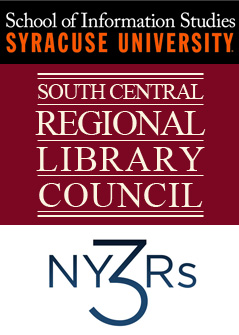A press release on a new IMLS grant we’re doing with the fantastic folks at South Central Regional Library Council
Original story at http://ischool.syr.edu/newsroom/index.aspx?recid=1620
IMLS Grant Funding Program to Boost Library Workers’ Online Teaching Skills
By: Diane Stirling
(315) 443-8975
 The School of Information Studies (iSchool), as a partner with the South Central Regional Library Council of Ithaca and The 3Rs Association, Inc., will be developing a program to strengthen the teaching and learning skills of library workers who provide outreach education using online learning environments.
The School of Information Studies (iSchool), as a partner with the South Central Regional Library Council of Ithaca and The 3Rs Association, Inc., will be developing a program to strengthen the teaching and learning skills of library workers who provide outreach education using online learning environments.
A grant of $336,665 has just been awarded to support the three-year project by the Institute of Museum and Library Services (IMLS) via its Laura Bush 21st Century Librarians Program. The monies will enable development of a program to guide transfer of in-person teaching skills and pedagogy to the online environment; help librarian-trainers evaluate and gain experience with various online delivery platforms; and teach library workers how people learn effectively in online education situations.
Project principal investigator is Mary-Carol Lindbloom, executive director of the South Central Regional Library Council. She conceived the skill-building program and invited the iSchool to participate. iSchool Professor R. David Lankes is Syracuse University’s liaison to the project. He will provide input into course development and delivery and oversee graduate assistant and hourly students who will be hired to help implement the program. iSchool faculty members Marilyn Plavovos Arnone and Jill Hurst-Wahl, plus WISE distance-education coordinator Alison Miller, also will help formulate program content.
The group plans to develop “train the trainer” materials for 120 librarians who are responsible for providing continuing education through their libraries. They also will develop an online learning segment, to deliver to 240 librarians from throughout New York State that illustrates best practices to support online learning.
Finding What Works
As more teaching changes from in-person classrooms to online platforms, there is a need for clear guidelines on what works and what doesn’t in terms of the pedagogy, technologies, and devices used in the online environment, according to Professor Lankes. “What’s happening is that people are saying, ‘I’ve taught this in person for 10 years; I’ll teach it online.’ Yet, it’s not like ‘shazam’, and you can teach it online. What we’ve learned at Syracuse since we began doing online education in 1993 is that there is no ‘shazam’ to this; there is a lot to think about when you make the transition to online teaching and learning. There are a lot of good instructors who do very interactive things when everyone’s seated around the table. The question then is, how do you do something like that in the online environment?”
Transferring Skills
Professor Arnone said that librarians are experiencing situations where the outreach and education they do increasingly involves online elements. The program will help develop skills for online teaching and unique aspects of learning via an online environment. The goal is to boost presentation and technology skills which library workers can use to conduct effective online sessions. “This is about being able to teach effectively and transfer what you know into an online environment, and understanding the differences in online learning, since not everyone likes it,” Arnone noted.
Those who teach online need to understand how to gain attention, make content relevant and interesting, and build learners’ confidence, while also setting clear expectations for the experience, she added. In addition to addressing those aspects, workers will learn how to offer “multiple means of representation–opportunities to present information in ways that learners can feel good about–so it’s coming to them in the way that they prefer. Addressing disability issues and accessibility for online learners, and the adjustments that can be made for online learning, also will be incorporated, Professor Arnone said.
Materials and presentations created for the program’s 10 informational modules will be available to the worldwide library community through the project’s LibGuides website, via WebJunction, and as disseminated through library conferences and publications.
